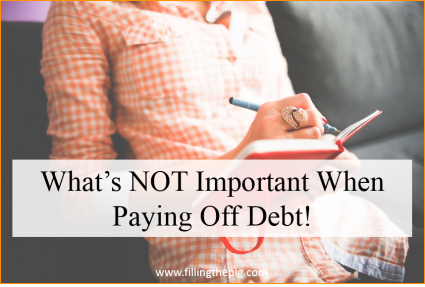Finding good practical advice on how to pay off your debt is easy. A simple Google search will get you a whole bunch of great articles. Including the ones, you can find here on FTP. However, what you won’t find often enough is articles on what’s NOT important when you’re paying off debt. The things that you shouldn’t worry about or consider as you make your journey to debt-free independence.
I participate in a number of personal finance forums like Reddit and have provided consulting services for individuals who are struggling to manage their way out of debt. Most often the questions focus on how to get started and how they should approach the payoff of credit cards, student loans, or should they save money first. Each situation and answer is different depending on the individual’s income level, budget and of course how much debt they have.
However, one common theme that inevitably becomes the main topic of discussion is how to prioritize all the other aspects of their finances – not just the debt. Subjects like retirement, buying a home, credit scores, kids’ education and investing. All of these topics get “lumped” into the same “how do I get out of debt” bucket.
Don’t Put the Cart Before the Horse
When this happens the task of paying off your debt and saving money becomes much more complex, more stressful, confusing and sometimes not even manageable. It creates an environment where the most important thing – getting out of debt, gets lost in all the noise created by the other topics.
The ability to prioritize your efforts and stay focused is as important as the amount of debt you have. Anything that does not help you get out of debt is nothing more than a distraction.
It’s the proverbial “putting the cart before the horse” idiom, when you focus on priorities that have nothing to do with accomplishing your overall goal, in this case getting out of debt. It’s like landscaping around your new home before you build it.
Here are three areas (questions) I have found that consistently come up when discussing debt payoff strategies. If your struggling with a mound of debt these areas should NOT be a priority when you’re trying to pay off debt.
#1. Saving for the Kids College Education When You’re Trying to Pay Off Debt
Typically these questions focus on taking money that should really be used to establish an emergency fund or pay off debt faster and using it to save for college.
Should saving for your son or daughter’s college education be a priority when you’re struggling with debt? NOPE.
If you’re a parent, of course, you want to be able to provide your children with every opportunity to have a great life. Education is one of those opportunities. However, if you’re struggling to pay off debt and trying to manage your own finances successfully, it makes absolutely no sense to be saving money for a college fund if you can’t save enough money for yourself.
I have always been a firm believer that in order to provide your children with opportunities you have to have your own house in order first. Once you have established a rock-solid foundation you can then start thinking about saving for your child’s college fund.
Give your kids the security of knowing and learning (remember their learning from you) that you have your finances in order. Once you do, you will be able to provide your kids with the future opportunities that a college education can provide.
Related Posts to What’s Not Important When Paying Off Debt:
- Should You Consider a 0% Balance Transfer Offer to Pay Off Debt
- How to Create an Emergency Fund
- How to Create a Get Out of Debt Plan – Free Workbook Download
- 10 Successful Money Management Tips to Live By – from a 52-Year-Old
- Is Debt Consolidation a Good Idea? 3 Things to Consider
- Financial Independence is About Controlling Your Own Destiny
- Cutting Cable, Saving Money and Getting Comfortable with Feeling Uncomfortable
#2. Your Credit Score – Not Important When Paying Off Debt
These types of questions generally focus on the fact the individual has multiple forms of credit card debt and is trying to figure out how to best manage the debt without impacting their credit score. Because someday they want to buy a house or a new car.
Should you worry about your credit score when you’re struggling to save money or pay off debt? Absolutely Not!
The focus on having a good credit score is propagated in the media from those companies that make a living by providing individuals with credit. Credit card companies and financial institutions. You only need a good credit score if you are thinking about taking out a loan, and if you’re in debt a loan is the last thing you need.
The reality is that even if you can obtain a rockstar credit score but are unable to save money on a regular basis, it’s unlikely you will be approved for a loan. When providing a loan, financial institutions like banks and credit unions not only look at an individual’s credit score but their wages and ability to consistently save money.
Think of it like this.
If you’re a bank would you provide a home loan to someone with a great credit score but has no ability to save money for an emergency. Like the next time, the roof needs repair, or the furnace goes out. From a business perspective, financial institutions view these types of individuals as high risk. They are one step away from missing a loan payment.
Pay off your debt, save money and your credit score will take care of itself. And then if you need a loan your bank will love you for having so much cash in your savings account.
Note: I am a huge fan of using a credit score reporting service like Credit Karma as a means of monitoring your score for fraud and inaccurate credit reporting. However, not from the perspective that monitoring your score keeps you from focusing on what’s most important – paying off debt.
#3. Investing and Retirement
We would all like to retire early and do it in a way that allows us to live comfortably. However, most don’t consider that the key to understanding how much money you need to retire is directly correlated with how much debt you have. The more debt the more money you need to retire on.
If you’re struggling to get out of debt you shouldn’t be thinking about how to save for retirement through a 401(k) plan, IRA or investing in the stock market. Consider this.
If you’re being charged 18-20% interest on your credit card and you start allocating your paycheck to a 401(k) or IRA that only earns 6% per year, then you’re losing 12-14% each year.
Investing and saving for retirement at any level always has some level of risk. Before you can assume that risk its best to take care of your debt first. Once your debt is paid off you can start saving for retirement with little effort. And with no debt, you will need a lot less money to retire on.
In Summary
There will be naysayers that say you can save for retirement, maintain a great credit score, save for college and pay off debt. You know, chew gum and walk at the same time. In some cases, this may be true depending on how much debt you have and how much money you make.
However, if you’re struggling with debt and trying to save money the greatest detriment to success is trying to do too many things at once. Your retirement, credit score and saving for college will defocus you from what is really important – getting out of debt fast.
Don’t put the cart before the horse. Pay off debt, save money first. Saving for college, improving your credit score and saving for retirement will take place easily and quickly after you have a solid foundation to work from.
Recommended Resources:
- Credit Karma – Free Credit Score, Monitoring & Insights
- Emotional Agility, by Susan David, Get Unstuck, Embrace Change, and Thrive in Work and Life
- Your Money or Your Life, Vicki Robbin Your Money or Your Life: 9 Steps to Transforming Your Relationship with Money and Achieving Financial Independence
- FTP eBook Series – Step by Step to Financial Independence
What are your thoughts on prioritizing retirement, credit scores and saving for a college education as you pay off debt? Comment below.



